The Role of Leadership and Management in Sainsbury's Operations Report
VerifiedAdded on 2020/12/09
|10
|2563
|195
Report
AI Summary
This report provides an overview of leadership and management within Sainsbury's operations. It begins with an introduction to operational management and the structure of Sainsbury's, followed by an analysis of how leadership roles and management functions are affected by different situations, including situational, task-oriented, and relationship-oriented leadership theories. The report then explores the roles of leaders and managers in operational functions, such as Six Sigma, lean production, and queuing theory, as well as the application of TQM and operational functions like control and distribution systems, and capacity management. The final section examines the relationship between leadership and management and corporate social responsibilities, including ethics, values, and sustainability initiatives undertaken by Sainsbury's, and concludes with a discussion on stakeholder relationships and entrepreneurship. The report highlights the importance of leaders and managers in driving operational effectiveness and achieving corporate social responsibility goals.
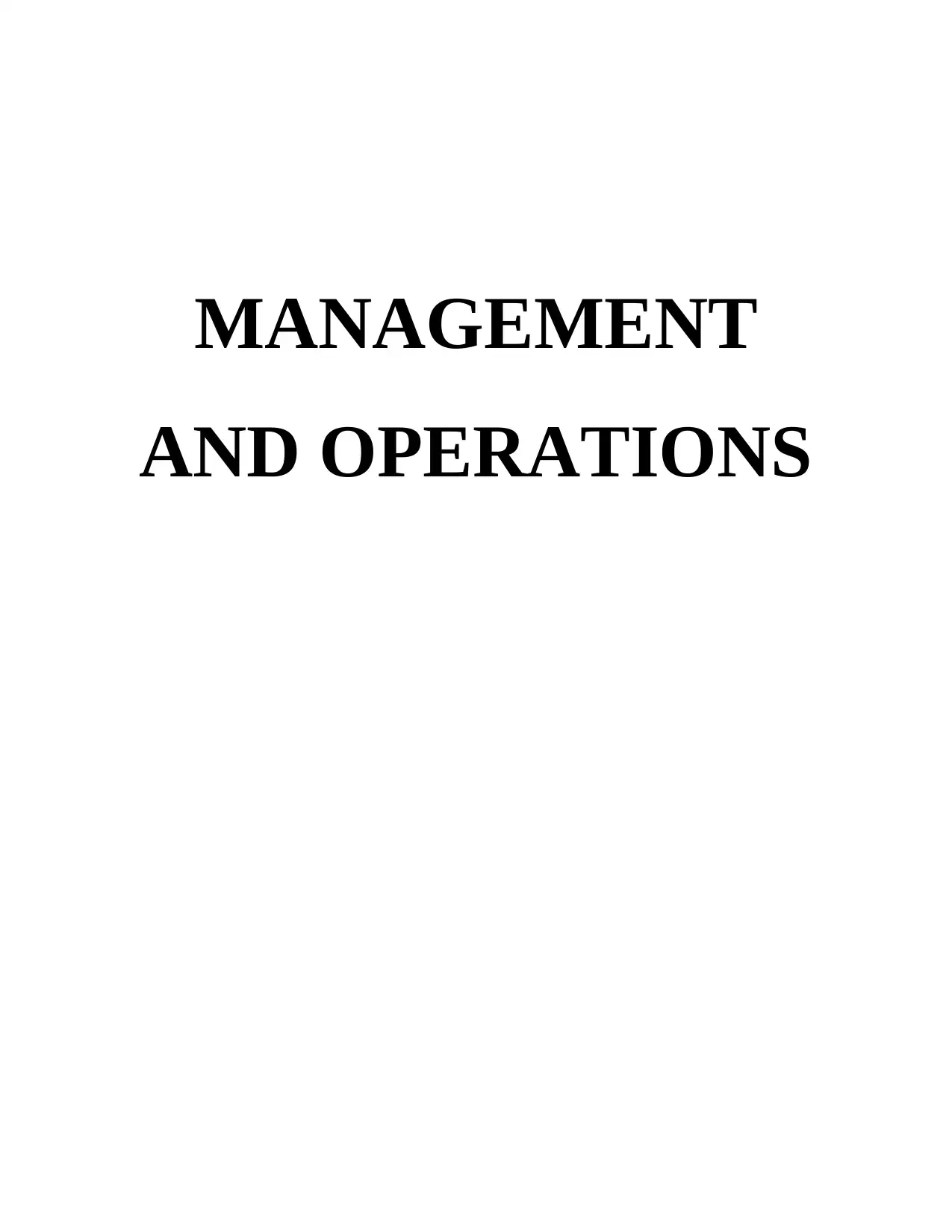
MANAGEMENT
AND OPERATIONS
AND OPERATIONS
Paraphrase This Document
Need a fresh take? Get an instant paraphrase of this document with our AI Paraphraser
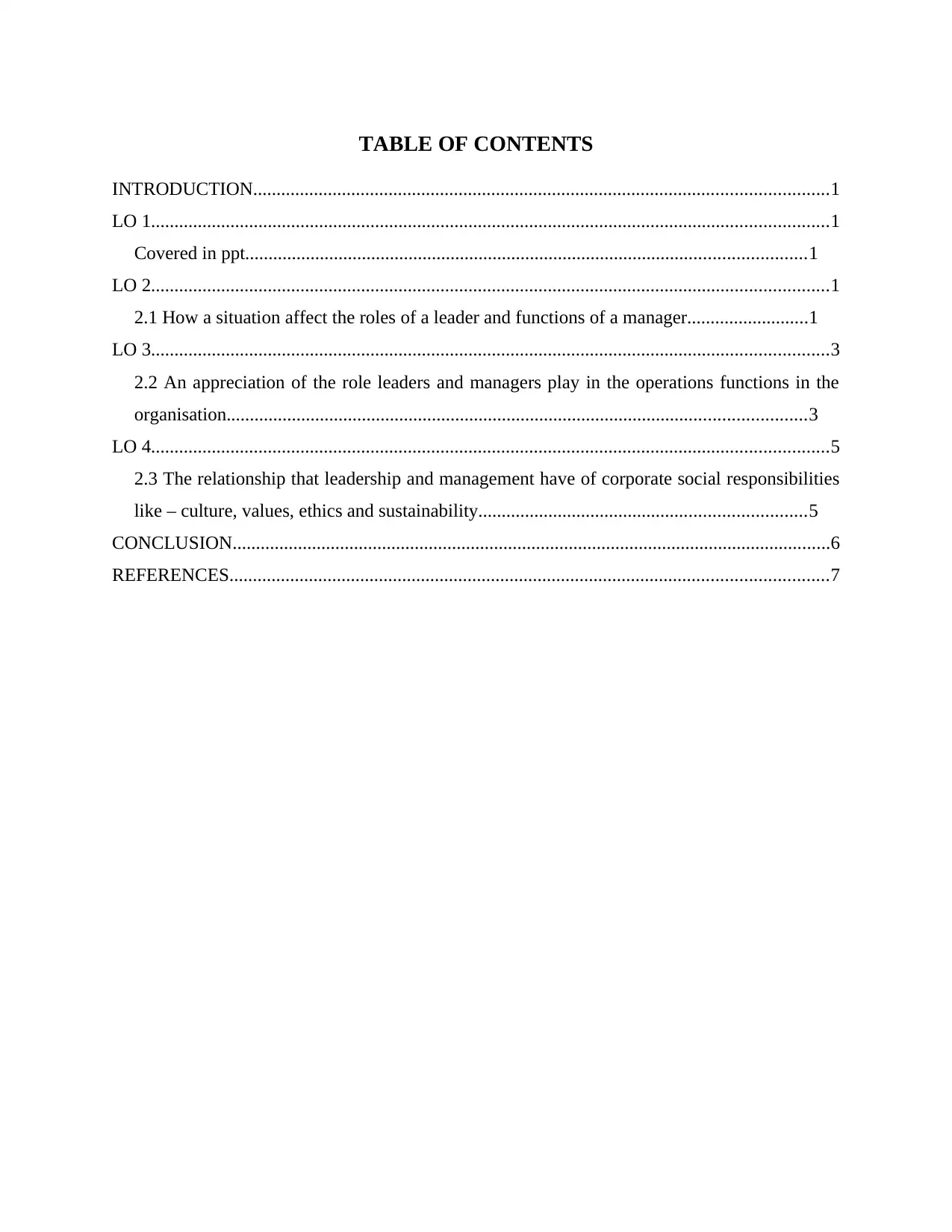
TABLE OF CONTENTS
INTRODUCTION...........................................................................................................................1
LO 1.................................................................................................................................................1
Covered in ppt........................................................................................................................1
LO 2.................................................................................................................................................1
2.1 How a situation affect the roles of a leader and functions of a manager..........................1
LO 3.................................................................................................................................................3
2.2 An appreciation of the role leaders and managers play in the operations functions in the
organisation............................................................................................................................3
LO 4.................................................................................................................................................5
2.3 The relationship that leadership and management have of corporate social responsibilities
like – culture, values, ethics and sustainability......................................................................5
CONCLUSION................................................................................................................................6
REFERENCES................................................................................................................................7
INTRODUCTION...........................................................................................................................1
LO 1.................................................................................................................................................1
Covered in ppt........................................................................................................................1
LO 2.................................................................................................................................................1
2.1 How a situation affect the roles of a leader and functions of a manager..........................1
LO 3.................................................................................................................................................3
2.2 An appreciation of the role leaders and managers play in the operations functions in the
organisation............................................................................................................................3
LO 4.................................................................................................................................................5
2.3 The relationship that leadership and management have of corporate social responsibilities
like – culture, values, ethics and sustainability......................................................................5
CONCLUSION................................................................................................................................6
REFERENCES................................................................................................................................7
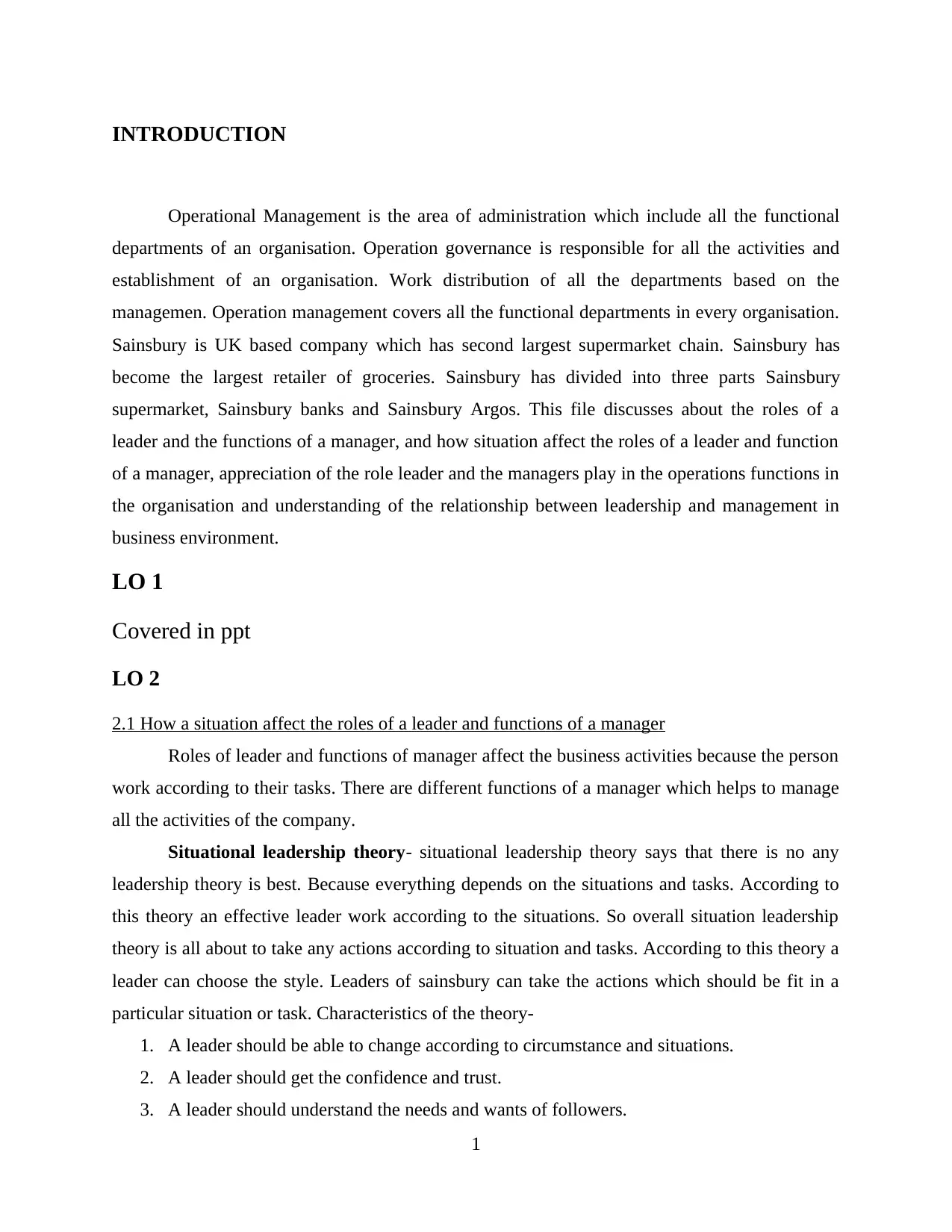
INTRODUCTION
Operational Management is the area of administration which include all the functional
departments of an organisation. Operation governance is responsible for all the activities and
establishment of an organisation. Work distribution of all the departments based on the
managemen. Operation management covers all the functional departments in every organisation.
Sainsbury is UK based company which has second largest supermarket chain. Sainsbury has
become the largest retailer of groceries. Sainsbury has divided into three parts Sainsbury
supermarket, Sainsbury banks and Sainsbury Argos. This file discusses about the roles of a
leader and the functions of a manager, and how situation affect the roles of a leader and function
of a manager, appreciation of the role leader and the managers play in the operations functions in
the organisation and understanding of the relationship between leadership and management in
business environment.
LO 1
Covered in ppt
LO 2
2.1 How a situation affect the roles of a leader and functions of a manager
Roles of leader and functions of manager affect the business activities because the person
work according to their tasks. There are different functions of a manager which helps to manage
all the activities of the company.
Situational leadership theory- situational leadership theory says that there is no any
leadership theory is best. Because everything depends on the situations and tasks. According to
this theory an effective leader work according to the situations. So overall situation leadership
theory is all about to take any actions according to situation and tasks. According to this theory a
leader can choose the style. Leaders of sainsbury can take the actions which should be fit in a
particular situation or task. Characteristics of the theory-
1. A leader should be able to change according to circumstance and situations.
2. A leader should get the confidence and trust.
3. A leader should understand the needs and wants of followers.
1
Operational Management is the area of administration which include all the functional
departments of an organisation. Operation governance is responsible for all the activities and
establishment of an organisation. Work distribution of all the departments based on the
managemen. Operation management covers all the functional departments in every organisation.
Sainsbury is UK based company which has second largest supermarket chain. Sainsbury has
become the largest retailer of groceries. Sainsbury has divided into three parts Sainsbury
supermarket, Sainsbury banks and Sainsbury Argos. This file discusses about the roles of a
leader and the functions of a manager, and how situation affect the roles of a leader and function
of a manager, appreciation of the role leader and the managers play in the operations functions in
the organisation and understanding of the relationship between leadership and management in
business environment.
LO 1
Covered in ppt
LO 2
2.1 How a situation affect the roles of a leader and functions of a manager
Roles of leader and functions of manager affect the business activities because the person
work according to their tasks. There are different functions of a manager which helps to manage
all the activities of the company.
Situational leadership theory- situational leadership theory says that there is no any
leadership theory is best. Because everything depends on the situations and tasks. According to
this theory an effective leader work according to the situations. So overall situation leadership
theory is all about to take any actions according to situation and tasks. According to this theory a
leader can choose the style. Leaders of sainsbury can take the actions which should be fit in a
particular situation or task. Characteristics of the theory-
1. A leader should be able to change according to circumstance and situations.
2. A leader should get the confidence and trust.
3. A leader should understand the needs and wants of followers.
1
⊘ This is a preview!⊘
Do you want full access?
Subscribe today to unlock all pages.

Trusted by 1+ million students worldwide
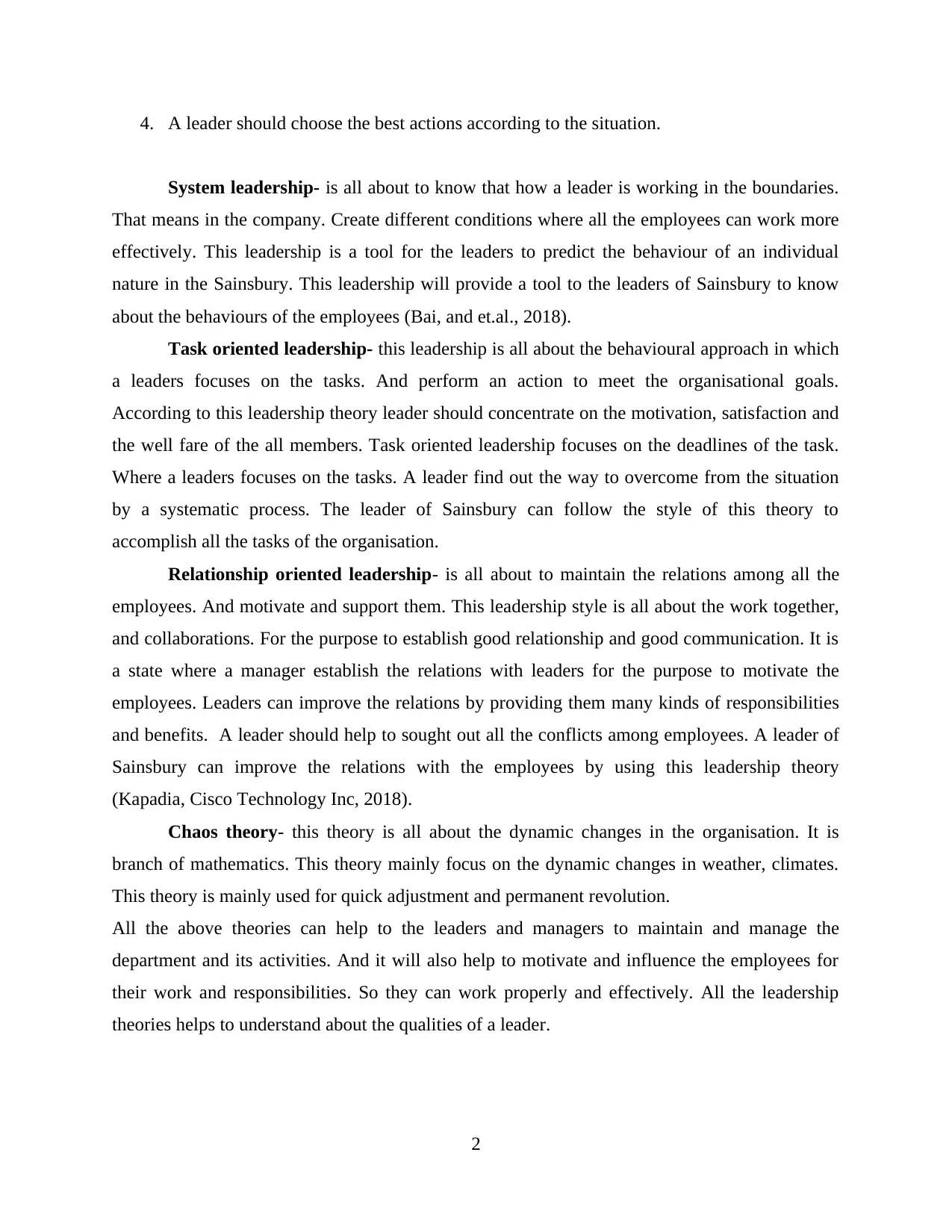
4. A leader should choose the best actions according to the situation.
System leadership- is all about to know that how a leader is working in the boundaries.
That means in the company. Create different conditions where all the employees can work more
effectively. This leadership is a tool for the leaders to predict the behaviour of an individual
nature in the Sainsbury. This leadership will provide a tool to the leaders of Sainsbury to know
about the behaviours of the employees (Bai, and et.al., 2018).
Task oriented leadership- this leadership is all about the behavioural approach in which
a leaders focuses on the tasks. And perform an action to meet the organisational goals.
According to this leadership theory leader should concentrate on the motivation, satisfaction and
the well fare of the all members. Task oriented leadership focuses on the deadlines of the task.
Where a leaders focuses on the tasks. A leader find out the way to overcome from the situation
by a systematic process. The leader of Sainsbury can follow the style of this theory to
accomplish all the tasks of the organisation.
Relationship oriented leadership- is all about to maintain the relations among all the
employees. And motivate and support them. This leadership style is all about the work together,
and collaborations. For the purpose to establish good relationship and good communication. It is
a state where a manager establish the relations with leaders for the purpose to motivate the
employees. Leaders can improve the relations by providing them many kinds of responsibilities
and benefits. A leader should help to sought out all the conflicts among employees. A leader of
Sainsbury can improve the relations with the employees by using this leadership theory
(Kapadia, Cisco Technology Inc, 2018).
Chaos theory- this theory is all about the dynamic changes in the organisation. It is
branch of mathematics. This theory mainly focus on the dynamic changes in weather, climates.
This theory is mainly used for quick adjustment and permanent revolution.
All the above theories can help to the leaders and managers to maintain and manage the
department and its activities. And it will also help to motivate and influence the employees for
their work and responsibilities. So they can work properly and effectively. All the leadership
theories helps to understand about the qualities of a leader.
2
System leadership- is all about to know that how a leader is working in the boundaries.
That means in the company. Create different conditions where all the employees can work more
effectively. This leadership is a tool for the leaders to predict the behaviour of an individual
nature in the Sainsbury. This leadership will provide a tool to the leaders of Sainsbury to know
about the behaviours of the employees (Bai, and et.al., 2018).
Task oriented leadership- this leadership is all about the behavioural approach in which
a leaders focuses on the tasks. And perform an action to meet the organisational goals.
According to this leadership theory leader should concentrate on the motivation, satisfaction and
the well fare of the all members. Task oriented leadership focuses on the deadlines of the task.
Where a leaders focuses on the tasks. A leader find out the way to overcome from the situation
by a systematic process. The leader of Sainsbury can follow the style of this theory to
accomplish all the tasks of the organisation.
Relationship oriented leadership- is all about to maintain the relations among all the
employees. And motivate and support them. This leadership style is all about the work together,
and collaborations. For the purpose to establish good relationship and good communication. It is
a state where a manager establish the relations with leaders for the purpose to motivate the
employees. Leaders can improve the relations by providing them many kinds of responsibilities
and benefits. A leader should help to sought out all the conflicts among employees. A leader of
Sainsbury can improve the relations with the employees by using this leadership theory
(Kapadia, Cisco Technology Inc, 2018).
Chaos theory- this theory is all about the dynamic changes in the organisation. It is
branch of mathematics. This theory mainly focus on the dynamic changes in weather, climates.
This theory is mainly used for quick adjustment and permanent revolution.
All the above theories can help to the leaders and managers to maintain and manage the
department and its activities. And it will also help to motivate and influence the employees for
their work and responsibilities. So they can work properly and effectively. All the leadership
theories helps to understand about the qualities of a leader.
2
Paraphrase This Document
Need a fresh take? Get an instant paraphrase of this document with our AI Paraphraser
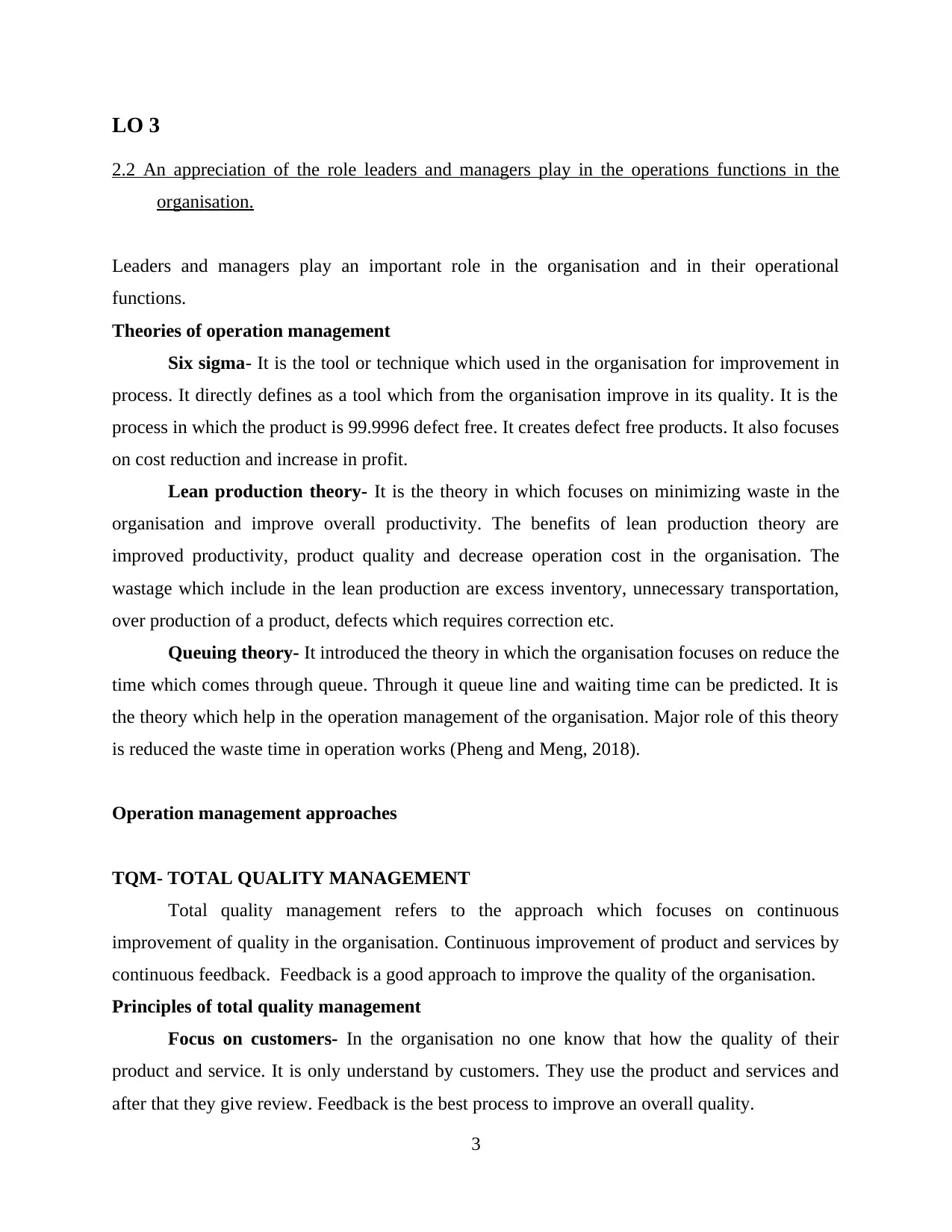
LO 3
2.2 An appreciation of the role leaders and managers play in the operations functions in the
organisation.
Leaders and managers play an important role in the organisation and in their operational
functions.
Theories of operation management
Six sigma- It is the tool or technique which used in the organisation for improvement in
process. It directly defines as a tool which from the organisation improve in its quality. It is the
process in which the product is 99.9996 defect free. It creates defect free products. It also focuses
on cost reduction and increase in profit.
Lean production theory- It is the theory in which focuses on minimizing waste in the
organisation and improve overall productivity. The benefits of lean production theory are
improved productivity, product quality and decrease operation cost in the organisation. The
wastage which include in the lean production are excess inventory, unnecessary transportation,
over production of a product, defects which requires correction etc.
Queuing theory- It introduced the theory in which the organisation focuses on reduce the
time which comes through queue. Through it queue line and waiting time can be predicted. It is
the theory which help in the operation management of the organisation. Major role of this theory
is reduced the waste time in operation works (Pheng and Meng, 2018).
Operation management approaches
TQM- TOTAL QUALITY MANAGEMENT
Total quality management refers to the approach which focuses on continuous
improvement of quality in the organisation. Continuous improvement of product and services by
continuous feedback. Feedback is a good approach to improve the quality of the organisation.
Principles of total quality management
Focus on customers- In the organisation no one know that how the quality of their
product and service. It is only understand by customers. They use the product and services and
after that they give review. Feedback is the best process to improve an overall quality.
3
2.2 An appreciation of the role leaders and managers play in the operations functions in the
organisation.
Leaders and managers play an important role in the organisation and in their operational
functions.
Theories of operation management
Six sigma- It is the tool or technique which used in the organisation for improvement in
process. It directly defines as a tool which from the organisation improve in its quality. It is the
process in which the product is 99.9996 defect free. It creates defect free products. It also focuses
on cost reduction and increase in profit.
Lean production theory- It is the theory in which focuses on minimizing waste in the
organisation and improve overall productivity. The benefits of lean production theory are
improved productivity, product quality and decrease operation cost in the organisation. The
wastage which include in the lean production are excess inventory, unnecessary transportation,
over production of a product, defects which requires correction etc.
Queuing theory- It introduced the theory in which the organisation focuses on reduce the
time which comes through queue. Through it queue line and waiting time can be predicted. It is
the theory which help in the operation management of the organisation. Major role of this theory
is reduced the waste time in operation works (Pheng and Meng, 2018).
Operation management approaches
TQM- TOTAL QUALITY MANAGEMENT
Total quality management refers to the approach which focuses on continuous
improvement of quality in the organisation. Continuous improvement of product and services by
continuous feedback. Feedback is a good approach to improve the quality of the organisation.
Principles of total quality management
Focus on customers- In the organisation no one know that how the quality of their
product and service. It is only understand by customers. They use the product and services and
after that they give review. Feedback is the best process to improve an overall quality.
3
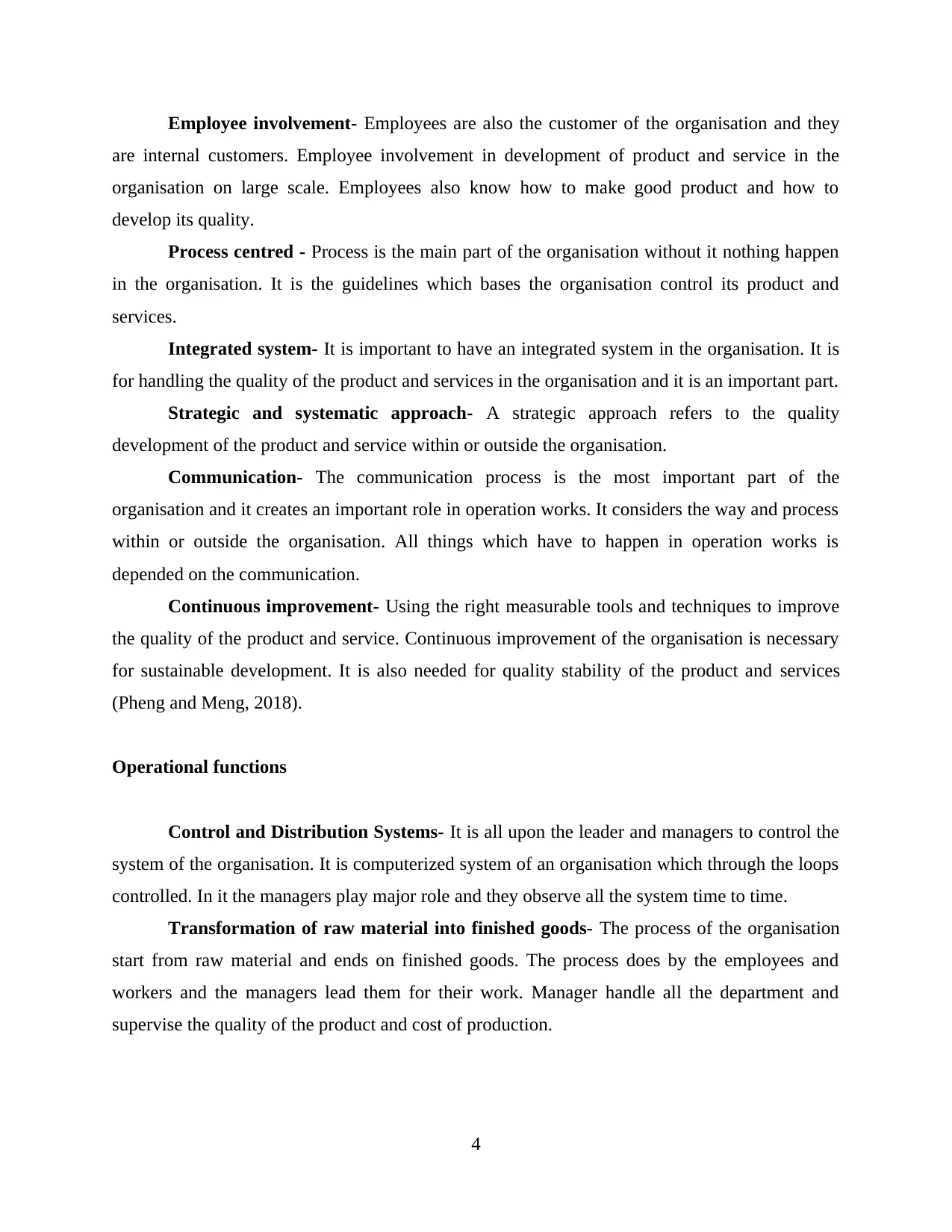
Employee involvement- Employees are also the customer of the organisation and they
are internal customers. Employee involvement in development of product and service in the
organisation on large scale. Employees also know how to make good product and how to
develop its quality.
Process centred - Process is the main part of the organisation without it nothing happen
in the organisation. It is the guidelines which bases the organisation control its product and
services.
Integrated system- It is important to have an integrated system in the organisation. It is
for handling the quality of the product and services in the organisation and it is an important part.
Strategic and systematic approach- A strategic approach refers to the quality
development of the product and service within or outside the organisation.
Communication- The communication process is the most important part of the
organisation and it creates an important role in operation works. It considers the way and process
within or outside the organisation. All things which have to happen in operation works is
depended on the communication.
Continuous improvement- Using the right measurable tools and techniques to improve
the quality of the product and service. Continuous improvement of the organisation is necessary
for sustainable development. It is also needed for quality stability of the product and services
(Pheng and Meng, 2018).
Operational functions
Control and Distribution Systems- It is all upon the leader and managers to control the
system of the organisation. It is computerized system of an organisation which through the loops
controlled. In it the managers play major role and they observe all the system time to time.
Transformation of raw material into finished goods- The process of the organisation
start from raw material and ends on finished goods. The process does by the employees and
workers and the managers lead them for their work. Manager handle all the department and
supervise the quality of the product and cost of production.
4
are internal customers. Employee involvement in development of product and service in the
organisation on large scale. Employees also know how to make good product and how to
develop its quality.
Process centred - Process is the main part of the organisation without it nothing happen
in the organisation. It is the guidelines which bases the organisation control its product and
services.
Integrated system- It is important to have an integrated system in the organisation. It is
for handling the quality of the product and services in the organisation and it is an important part.
Strategic and systematic approach- A strategic approach refers to the quality
development of the product and service within or outside the organisation.
Communication- The communication process is the most important part of the
organisation and it creates an important role in operation works. It considers the way and process
within or outside the organisation. All things which have to happen in operation works is
depended on the communication.
Continuous improvement- Using the right measurable tools and techniques to improve
the quality of the product and service. Continuous improvement of the organisation is necessary
for sustainable development. It is also needed for quality stability of the product and services
(Pheng and Meng, 2018).
Operational functions
Control and Distribution Systems- It is all upon the leader and managers to control the
system of the organisation. It is computerized system of an organisation which through the loops
controlled. In it the managers play major role and they observe all the system time to time.
Transformation of raw material into finished goods- The process of the organisation
start from raw material and ends on finished goods. The process does by the employees and
workers and the managers lead them for their work. Manager handle all the department and
supervise the quality of the product and cost of production.
4
⊘ This is a preview!⊘
Do you want full access?
Subscribe today to unlock all pages.

Trusted by 1+ million students worldwide
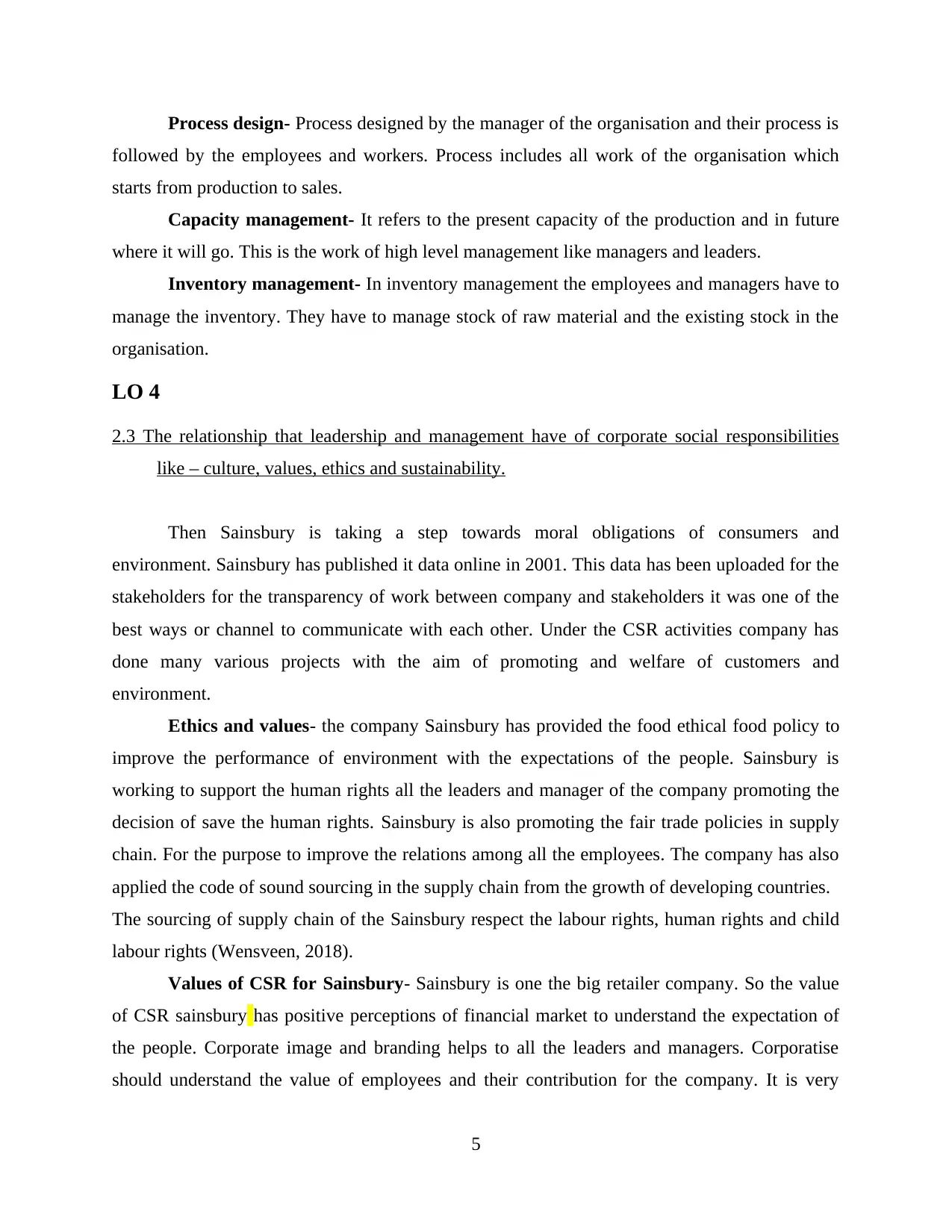
Process design- Process designed by the manager of the organisation and their process is
followed by the employees and workers. Process includes all work of the organisation which
starts from production to sales.
Capacity management- It refers to the present capacity of the production and in future
where it will go. This is the work of high level management like managers and leaders.
Inventory management- In inventory management the employees and managers have to
manage the inventory. They have to manage stock of raw material and the existing stock in the
organisation.
LO 4
2.3 The relationship that leadership and management have of corporate social responsibilities
like – culture, values, ethics and sustainability.
Then Sainsbury is taking a step towards moral obligations of consumers and
environment. Sainsbury has published it data online in 2001. This data has been uploaded for the
stakeholders for the transparency of work between company and stakeholders it was one of the
best ways or channel to communicate with each other. Under the CSR activities company has
done many various projects with the aim of promoting and welfare of customers and
environment.
Ethics and values- the company Sainsbury has provided the food ethical food policy to
improve the performance of environment with the expectations of the people. Sainsbury is
working to support the human rights all the leaders and manager of the company promoting the
decision of save the human rights. Sainsbury is also promoting the fair trade policies in supply
chain. For the purpose to improve the relations among all the employees. The company has also
applied the code of sound sourcing in the supply chain from the growth of developing countries.
The sourcing of supply chain of the Sainsbury respect the labour rights, human rights and child
labour rights (Wensveen, 2018).
Values of CSR for Sainsbury- Sainsbury is one the big retailer company. So the value
of CSR sainsbury has positive perceptions of financial market to understand the expectation of
the people. Corporate image and branding helps to all the leaders and managers. Corporatise
should understand the value of employees and their contribution for the company. It is very
5
followed by the employees and workers. Process includes all work of the organisation which
starts from production to sales.
Capacity management- It refers to the present capacity of the production and in future
where it will go. This is the work of high level management like managers and leaders.
Inventory management- In inventory management the employees and managers have to
manage the inventory. They have to manage stock of raw material and the existing stock in the
organisation.
LO 4
2.3 The relationship that leadership and management have of corporate social responsibilities
like – culture, values, ethics and sustainability.
Then Sainsbury is taking a step towards moral obligations of consumers and
environment. Sainsbury has published it data online in 2001. This data has been uploaded for the
stakeholders for the transparency of work between company and stakeholders it was one of the
best ways or channel to communicate with each other. Under the CSR activities company has
done many various projects with the aim of promoting and welfare of customers and
environment.
Ethics and values- the company Sainsbury has provided the food ethical food policy to
improve the performance of environment with the expectations of the people. Sainsbury is
working to support the human rights all the leaders and manager of the company promoting the
decision of save the human rights. Sainsbury is also promoting the fair trade policies in supply
chain. For the purpose to improve the relations among all the employees. The company has also
applied the code of sound sourcing in the supply chain from the growth of developing countries.
The sourcing of supply chain of the Sainsbury respect the labour rights, human rights and child
labour rights (Wensveen, 2018).
Values of CSR for Sainsbury- Sainsbury is one the big retailer company. So the value
of CSR sainsbury has positive perceptions of financial market to understand the expectation of
the people. Corporate image and branding helps to all the leaders and managers. Corporatise
should understand the value of employees and their contribution for the company. It is very
5
Paraphrase This Document
Need a fresh take? Get an instant paraphrase of this document with our AI Paraphraser
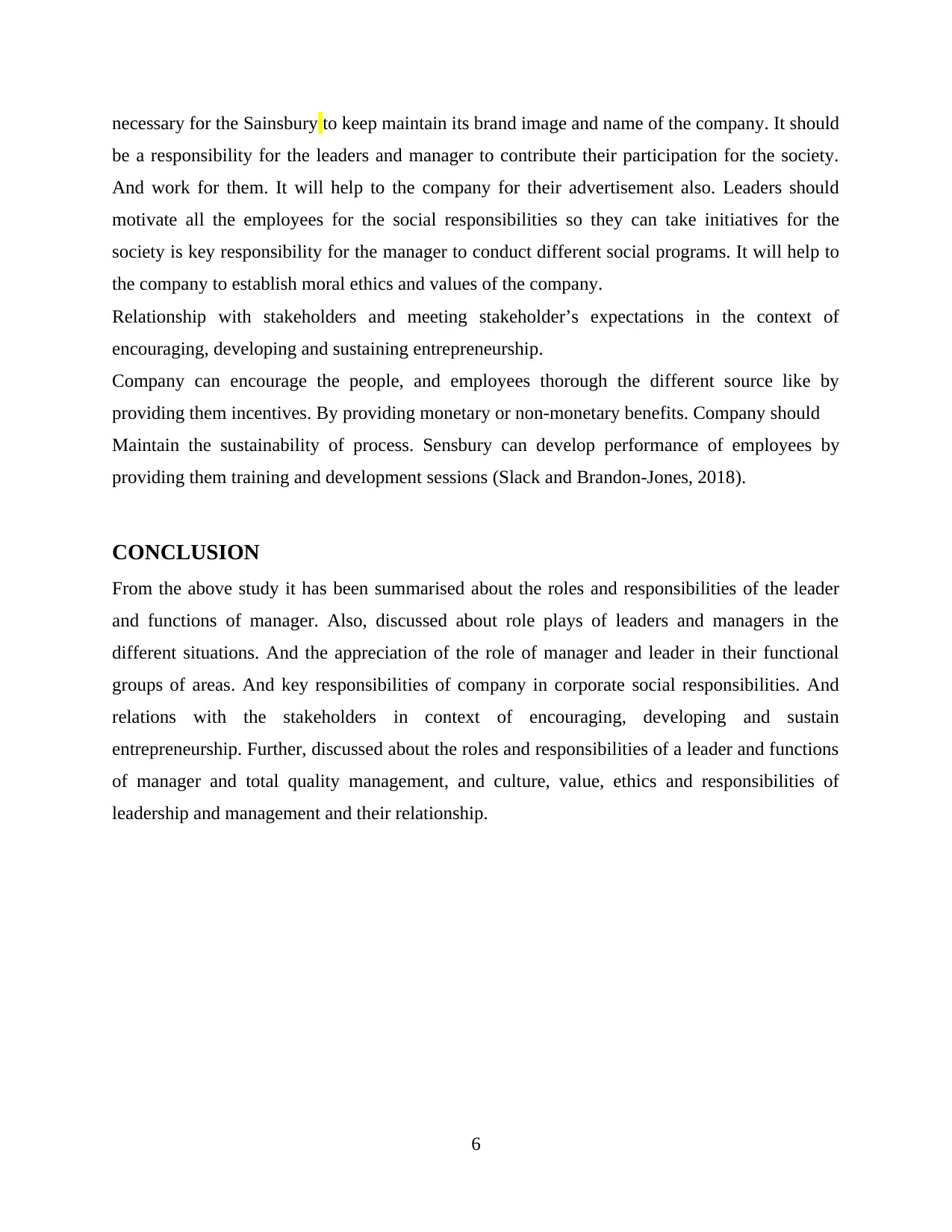
necessary for the Sainsbury to keep maintain its brand image and name of the company. It should
be a responsibility for the leaders and manager to contribute their participation for the society.
And work for them. It will help to the company for their advertisement also. Leaders should
motivate all the employees for the social responsibilities so they can take initiatives for the
society is key responsibility for the manager to conduct different social programs. It will help to
the company to establish moral ethics and values of the company.
Relationship with stakeholders and meeting stakeholder’s expectations in the context of
encouraging, developing and sustaining entrepreneurship.
Company can encourage the people, and employees thorough the different source like by
providing them incentives. By providing monetary or non-monetary benefits. Company should
Maintain the sustainability of process. Sensbury can develop performance of employees by
providing them training and development sessions (Slack and Brandon-Jones, 2018).
CONCLUSION
From the above study it has been summarised about the roles and responsibilities of the leader
and functions of manager. Also, discussed about role plays of leaders and managers in the
different situations. And the appreciation of the role of manager and leader in their functional
groups of areas. And key responsibilities of company in corporate social responsibilities. And
relations with the stakeholders in context of encouraging, developing and sustain
entrepreneurship. Further, discussed about the roles and responsibilities of a leader and functions
of manager and total quality management, and culture, value, ethics and responsibilities of
leadership and management and their relationship.
6
be a responsibility for the leaders and manager to contribute their participation for the society.
And work for them. It will help to the company for their advertisement also. Leaders should
motivate all the employees for the social responsibilities so they can take initiatives for the
society is key responsibility for the manager to conduct different social programs. It will help to
the company to establish moral ethics and values of the company.
Relationship with stakeholders and meeting stakeholder’s expectations in the context of
encouraging, developing and sustaining entrepreneurship.
Company can encourage the people, and employees thorough the different source like by
providing them incentives. By providing monetary or non-monetary benefits. Company should
Maintain the sustainability of process. Sensbury can develop performance of employees by
providing them training and development sessions (Slack and Brandon-Jones, 2018).
CONCLUSION
From the above study it has been summarised about the roles and responsibilities of the leader
and functions of manager. Also, discussed about role plays of leaders and managers in the
different situations. And the appreciation of the role of manager and leader in their functional
groups of areas. And key responsibilities of company in corporate social responsibilities. And
relations with the stakeholders in context of encouraging, developing and sustain
entrepreneurship. Further, discussed about the roles and responsibilities of a leader and functions
of manager and total quality management, and culture, value, ethics and responsibilities of
leadership and management and their relationship.
6
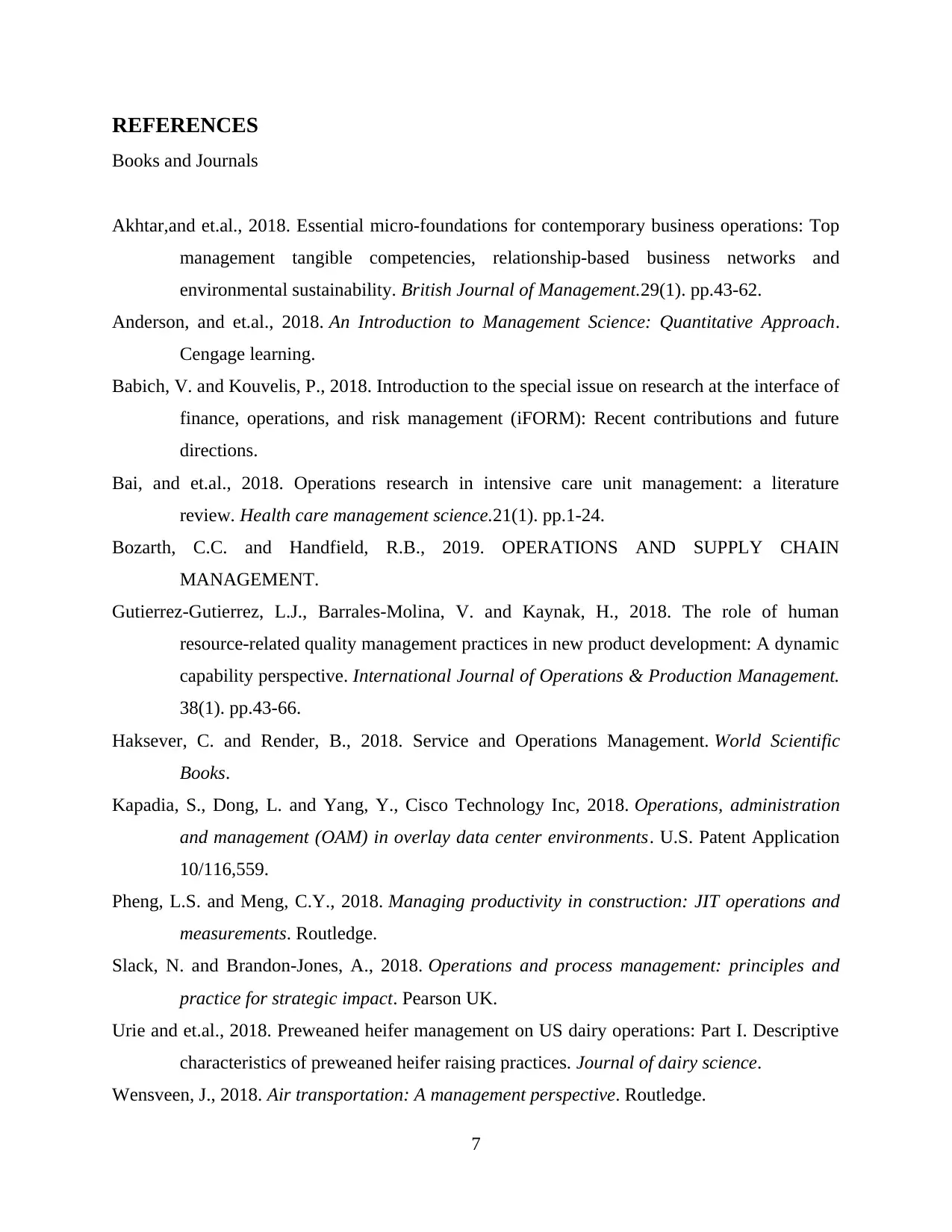
REFERENCES
Books and Journals
Akhtar,and et.al., 2018. Essential micro‐foundations for contemporary business operations: Top
management tangible competencies, relationship‐based business networks and
environmental sustainability. British Journal of Management.29(1). pp.43-62.
Anderson, and et.al., 2018. An Introduction to Management Science: Quantitative Approach.
Cengage learning.
Babich, V. and Kouvelis, P., 2018. Introduction to the special issue on research at the interface of
finance, operations, and risk management (iFORM): Recent contributions and future
directions.
Bai, and et.al., 2018. Operations research in intensive care unit management: a literature
review. Health care management science.21(1). pp.1-24.
Bozarth, C.C. and Handfield, R.B., 2019. OPERATIONS AND SUPPLY CHAIN
MANAGEMENT.
Gutierrez-Gutierrez, L.J., Barrales-Molina, V. and Kaynak, H., 2018. The role of human
resource-related quality management practices in new product development: A dynamic
capability perspective. International Journal of Operations & Production Management.
38(1). pp.43-66.
Haksever, C. and Render, B., 2018. Service and Operations Management. World Scientific
Books.
Kapadia, S., Dong, L. and Yang, Y., Cisco Technology Inc, 2018. Operations, administration
and management (OAM) in overlay data center environments. U.S. Patent Application
10/116,559.
Pheng, L.S. and Meng, C.Y., 2018. Managing productivity in construction: JIT operations and
measurements. Routledge.
Slack, N. and Brandon-Jones, A., 2018. Operations and process management: principles and
practice for strategic impact. Pearson UK.
Urie and et.al., 2018. Preweaned heifer management on US dairy operations: Part I. Descriptive
characteristics of preweaned heifer raising practices. Journal of dairy science.
Wensveen, J., 2018. Air transportation: A management perspective. Routledge.
7
Books and Journals
Akhtar,and et.al., 2018. Essential micro‐foundations for contemporary business operations: Top
management tangible competencies, relationship‐based business networks and
environmental sustainability. British Journal of Management.29(1). pp.43-62.
Anderson, and et.al., 2018. An Introduction to Management Science: Quantitative Approach.
Cengage learning.
Babich, V. and Kouvelis, P., 2018. Introduction to the special issue on research at the interface of
finance, operations, and risk management (iFORM): Recent contributions and future
directions.
Bai, and et.al., 2018. Operations research in intensive care unit management: a literature
review. Health care management science.21(1). pp.1-24.
Bozarth, C.C. and Handfield, R.B., 2019. OPERATIONS AND SUPPLY CHAIN
MANAGEMENT.
Gutierrez-Gutierrez, L.J., Barrales-Molina, V. and Kaynak, H., 2018. The role of human
resource-related quality management practices in new product development: A dynamic
capability perspective. International Journal of Operations & Production Management.
38(1). pp.43-66.
Haksever, C. and Render, B., 2018. Service and Operations Management. World Scientific
Books.
Kapadia, S., Dong, L. and Yang, Y., Cisco Technology Inc, 2018. Operations, administration
and management (OAM) in overlay data center environments. U.S. Patent Application
10/116,559.
Pheng, L.S. and Meng, C.Y., 2018. Managing productivity in construction: JIT operations and
measurements. Routledge.
Slack, N. and Brandon-Jones, A., 2018. Operations and process management: principles and
practice for strategic impact. Pearson UK.
Urie and et.al., 2018. Preweaned heifer management on US dairy operations: Part I. Descriptive
characteristics of preweaned heifer raising practices. Journal of dairy science.
Wensveen, J., 2018. Air transportation: A management perspective. Routledge.
7
⊘ This is a preview!⊘
Do you want full access?
Subscribe today to unlock all pages.

Trusted by 1+ million students worldwide
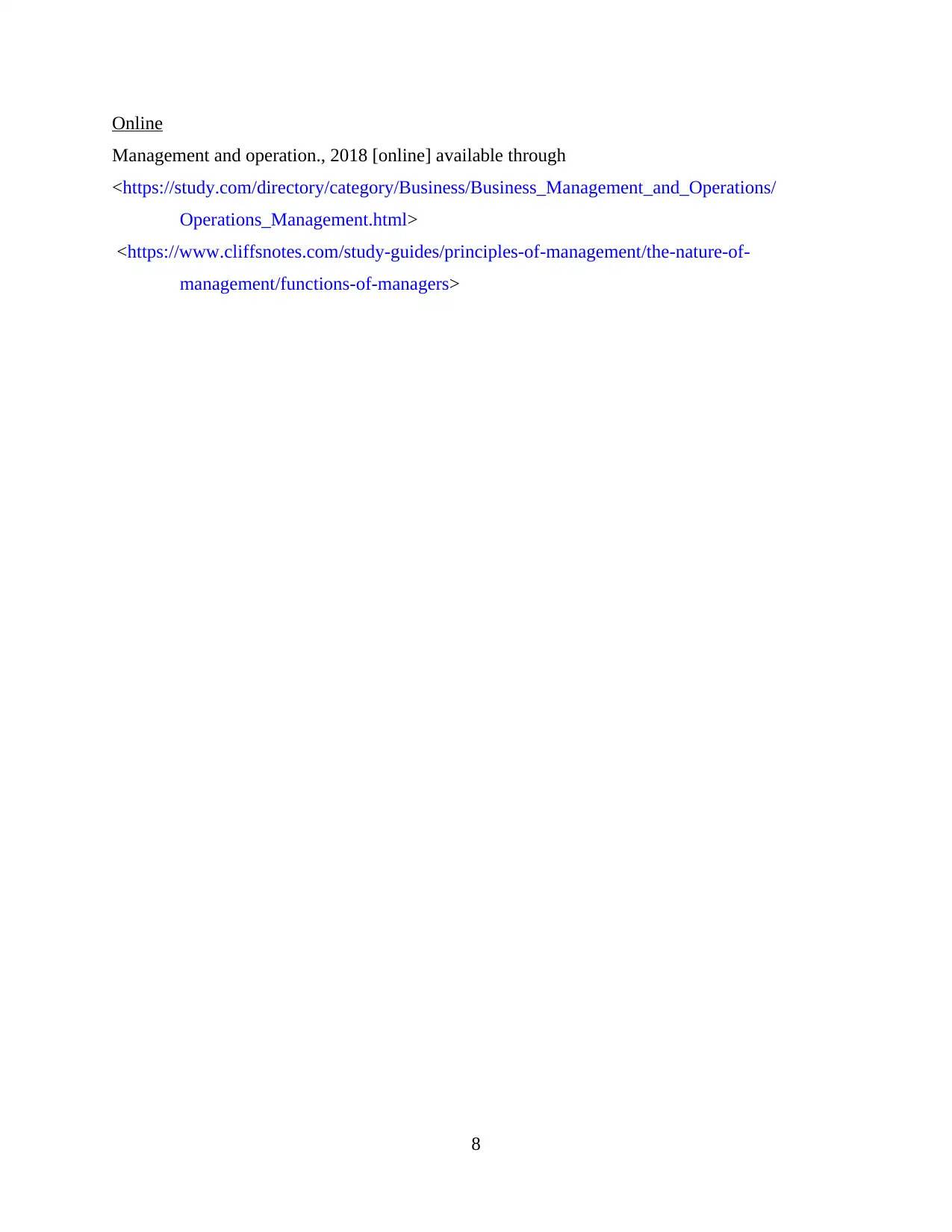
Online
Management and operation., 2018 [online] available through
<https://study.com/directory/category/Business/Business_Management_and_Operations/
Operations_Management.html>
<https://www.cliffsnotes.com/study-guides/principles-of-management/the-nature-of-
management/functions-of-managers>
8
Management and operation., 2018 [online] available through
<https://study.com/directory/category/Business/Business_Management_and_Operations/
Operations_Management.html>
<https://www.cliffsnotes.com/study-guides/principles-of-management/the-nature-of-
management/functions-of-managers>
8
1 out of 10
Related Documents
Your All-in-One AI-Powered Toolkit for Academic Success.
+13062052269
info@desklib.com
Available 24*7 on WhatsApp / Email
![[object Object]](/_next/static/media/star-bottom.7253800d.svg)
Unlock your academic potential
Copyright © 2020–2026 A2Z Services. All Rights Reserved. Developed and managed by ZUCOL.





